介词inonunder用法教学设计(教案)教学内容
- 格式:doc
- 大小:16.00 KB
- 文档页数:3
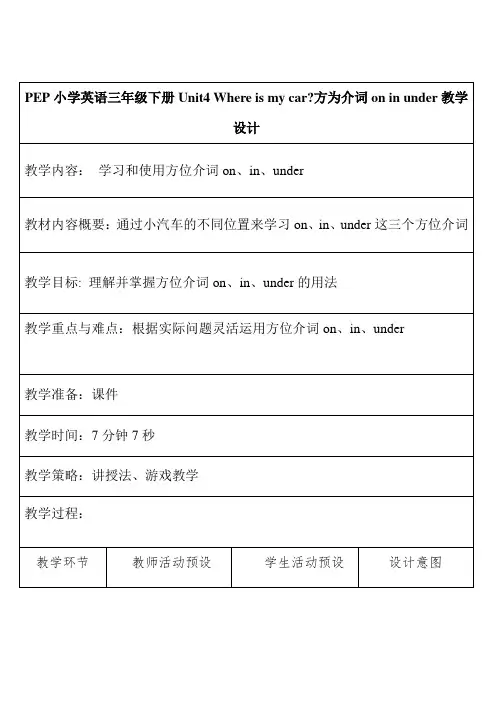
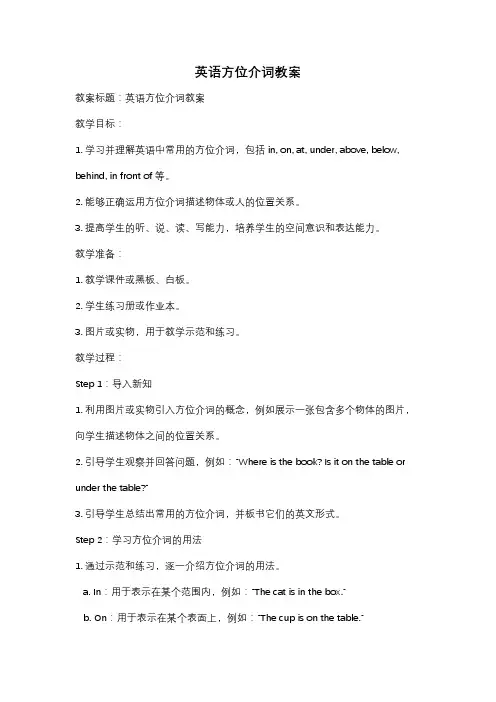
英语方位介词教案教案标题:英语方位介词教案教学目标:1. 学习并理解英语中常用的方位介词,包括in, on, at, under, above, below, behind, in front of等。
2. 能够正确运用方位介词描述物体或人的位置关系。
3. 提高学生的听、说、读、写能力,培养学生的空间意识和表达能力。
教学准备:1. 教学课件或黑板、白板。
2. 学生练习册或作业本。
3. 图片或实物,用于教学示范和练习。
教学过程:Step 1:导入新知1. 利用图片或实物引入方位介词的概念,例如展示一张包含多个物体的图片,向学生描述物体之间的位置关系。
2. 引导学生观察并回答问题,例如:“Where is the book? Is it on the table or under the table?”3. 引导学生总结出常用的方位介词,并板书它们的英文形式。
Step 2:学习方位介词的用法1. 通过示范和练习,逐一介绍方位介词的用法。
a. In:用于表示在某个范围内,例如:“The cat is in the box.”b. On:用于表示在某个表面上,例如:“The cup is on the table.”c. At:用于表示在某个具体位置上,例如:“The school is at the end of the street.”d. Under:用于表示在某物体下方,例如:“The ball is under the chair.”e. Above:用于表示在某物体上方,例如:“The clouds are above the mountains.”f. Below:用于表示在某物体下方,例如:“The fish is below the water.”g. Behind:用于表示在某物体后方,例如:“The tree is behind the house.”h. In front of:用于表示在某物体前方,例如:“The car is in front of the building.”2. 结合示范和练习,让学生逐步掌握方位介词的用法,并进行口头练习。
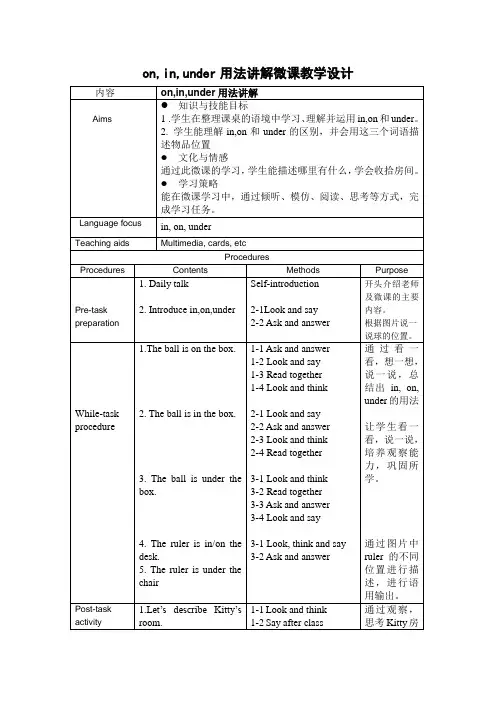
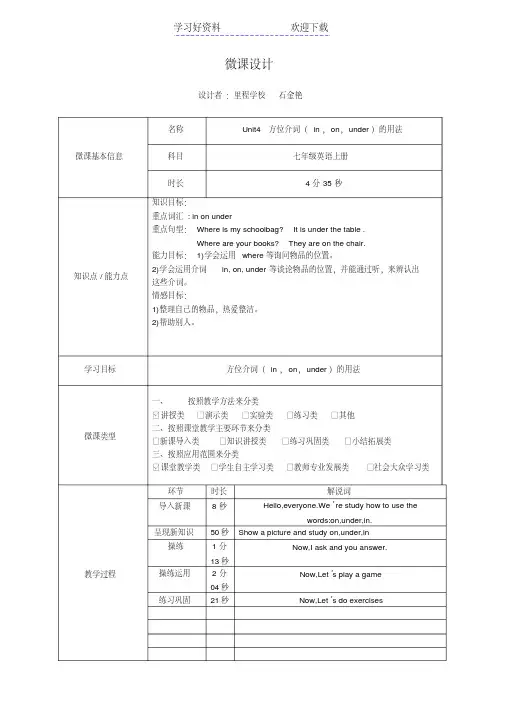
微课设计设计者:里程学校石金艳微课基本信息名称Unit4 方位介词(in,on,under)的用法科目七年级英语上册时长4分35秒知识点/能力点知识目标:重点词汇: in on under重点句型:Where is my schoolbag? It is under the table .Where are your books? They are on the chair.能力目标:1)学会运用where等询问物品的位置。
2)学会运用介词in, on, under等谈论物品的位置,并能通过听,来辨认出这些介词。
情感目标:1)整理自己的物品,热爱整洁。
2)帮助别人。
学习目标方位介词(in,on,under)的用法微课类型一、按照教学方法来分类□√讲授类□演示类□实验类□练习类□其他二、按照课堂教学主要环节来分类□新课导入类□知识讲授类□练习巩固类□小结拓展类三、按照应用范围来分类□√课堂教学类□学生自主学习类□教师专业发展类□社会大众学习类教学过程环节时长解说词导入新课8秒Hello,everyone.We’re study how to use thewords:on,under,in.呈现新知识50秒Show a picture and study on,under,in 操练1分13秒Now,I ask and you answer.操练运用2分04秒Now,Let’s play a game练习巩固21秒Now,Let’s do exercises选择录课的方式□利用PowerPoint+配音的方式录制□利用数码设备录制□利用电子白板录制□√利用录屏软件录制设计的理念与特色充分运用现代教育技术,利用计算机和多媒体教学软件,开发教学模式,拓宽学生学习渠道,改进学生学习方式,丰富教育教学课堂,吸引学生注意力,激发学生学习英语的兴趣,解决学习英语语法知识的枯燥,形象,直观的展示知识,突破知识难点,提高教学效果。
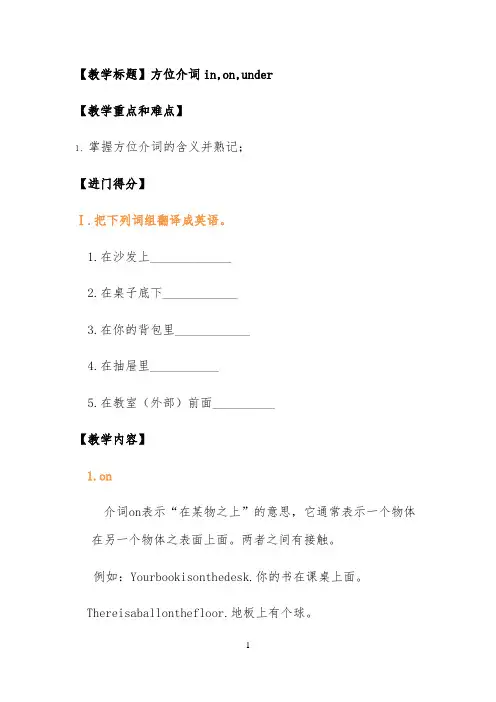
【教学标题】方位介词in,on,under【教学重点和难点】1、掌握方位介词的含义并熟记;【进门得分】Ⅰ.把下列词组翻译成英语。
1.在沙发上_____________2.在桌子底下____________3.在你的背包里____________4.在抽屉里___________5.在教室(外部)前面__________【教学内容】1.on介词on表示“在某物之上”的意思,它通常表示一个物体在另一个物体之表面上面。
两者之间有接触。
例如:Yourbookisonthedesk.你的书在课桌上面。
Thereisaballonthefloor.地板上有个球。
2.in介词in表示“在某物的里面”,它通常表示一个物体在另外一个物体的内部、中间或者在某个范围之内。
例如:Yourpenisinthepencilcase.你的钢笔在铅笔盒里面。
Sheisthetallestinherclass.她是她们班最高的。
3.under介词under表示“在某物的下面”,它通常表示一个物体在另外一个物体的垂直正下面,两者之间没有接触。
例如:Mybikeisunderthetree.我的自行车在树的下面。
Theshoesareunderthechair.鞋在椅子的下面。
注意:1.镶嵌在墙里的物品,如门,窗等,用in;2.挂在墙上的一类物品,如地图,字画等,用on;3.长在树上的东西用on,飞在或落在树上的东西用in。
【过手练习】Ⅱ.单项选则。
1._________ismyschoolbag?A.WhatB.WhereC.When2.Lookatthemap___thewall.It’samapofChina.A.onB.atC.in3.Aphotois___thewall,andthetoysare___thetableA.in,underB.in,onC.on,under【真题链接】1.—Mygreenringisintheroom.Whataboutyours?—_________.A.It’sredB.It’sonthetableC.It’sAlice’s2.Thereare30classrooms____________ourschool.Mineis___ __________thesecondfloor.A.on;inB.in;inC.in;onD.on;on3.Ihaveafriendandmyfriendis________China.A.inB.atC.onD.under【拓展训练】III.用适当的介词填空。
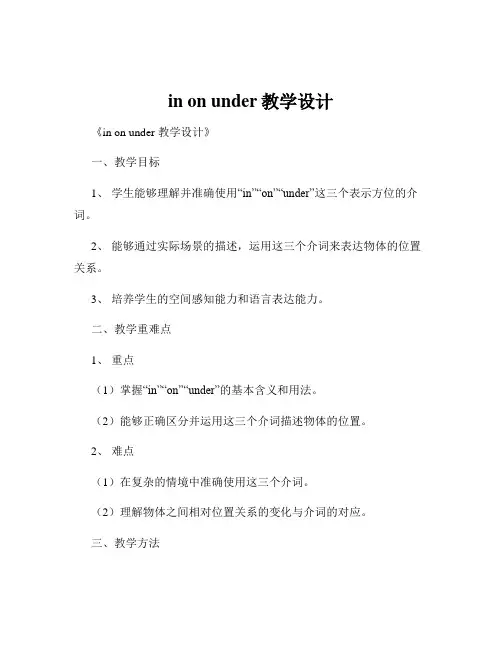
in on under教学设计《in on under 教学设计》一、教学目标1、学生能够理解并准确使用“in”“on”“under”这三个表示方位的介词。
2、能够通过实际场景的描述,运用这三个介词来表达物体的位置关系。
3、培养学生的空间感知能力和语言表达能力。
二、教学重难点1、重点(1)掌握“in”“on”“under”的基本含义和用法。
(2)能够正确区分并运用这三个介词描述物体的位置。
2、难点(1)在复杂的情境中准确使用这三个介词。
(2)理解物体之间相对位置关系的变化与介词的对应。
三、教学方法1、直观教学法:通过展示实物、图片等直观教具,让学生直接感知物体的位置关系,理解介词的含义。
2、情景教学法:创设生活中的实际场景,如房间布置、教室物品摆放等,让学生在具体情境中运用所学介词。
3、游戏教学法:设计有趣的游戏活动,如“找物品”“猜位置”等,增加学习的趣味性,巩固所学知识。
四、教学过程1、导入(1)展示一个装满物品的盒子,拿出一个苹果,问学生:“Where is the apple?”引导学生用中文回答“在盒子里”,然后教师用英语说:“The apple is in the box”并将“in”写在黑板上,用手指着盒子和苹果,重复几遍“in”的发音和用法。
(2)再拿出一本书,放在盒子上面,问:“Where is the book?”引导学生回答“在盒子上”,教师说:“The book is on the box”并将“on”写在黑板上,同样用动作和语言强调其含义和发音。
(3)最后把一支铅笔放在盒子下面,问:“Where is the pencil?”学生回答“在盒子下”,教师说:“The pencil is under the box”并将“under”写在黑板上,进行讲解和示范。
2、新授(1)利用图片展示不同的场景,如桌子上的杯子、椅子下面的书包、书包里的书等,让学生观察并说出物体的位置,使用“in”“on”“under”来描述。
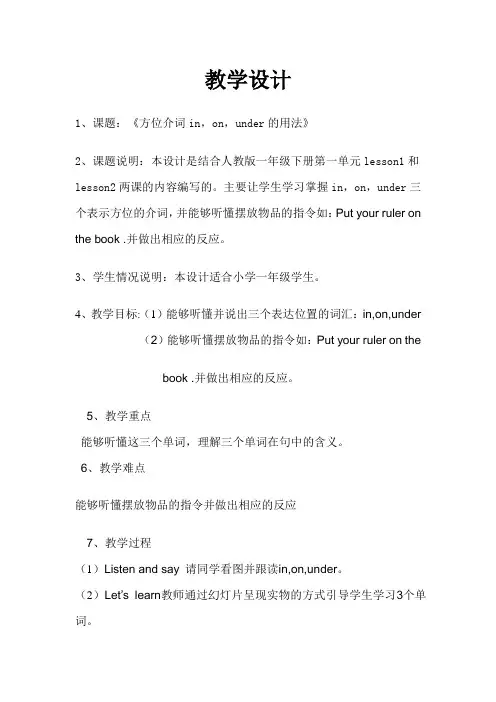
教学设计
1、课题:《方位介词in,on,under的用法》
2、课题说明:本设计是结合人教版一年级下册第一单元lesson1和lesson2两课的内容编写的。
主要让学生学习掌握in,on,under三个表示方位的介词,并能够听懂摆放物品的指令如:Put your ruler on the book .并做出相应的反应。
3、学生情况说明:本设计适合小学一年级学生。
4、教学目标:(1)能够听懂并说出三个表达位置的词汇:in,on,under
(2)能够听懂摆放物品的指令如:Put your ruler on the
book .并做出相应的反应。
5、教学重点
能够听懂这三个单词,理解三个单词在句中的含义。
6、教学难点
能够听懂摆放物品的指令并做出相应的反应
7、教学过程
(1)Listen and say 请同学看图并跟读in,on,under。
(2)Let’s learn教师通过幻灯片呈现实物的方式引导学生学习3个单词。
(3)Look,listen and do 通过看视频短片让学生和老师一起动手做一做,体会并学习3个单词。
(4)Practice 通过做练习来巩固新单词。
(5)Summary总结并通过儿歌来巧记新单词。
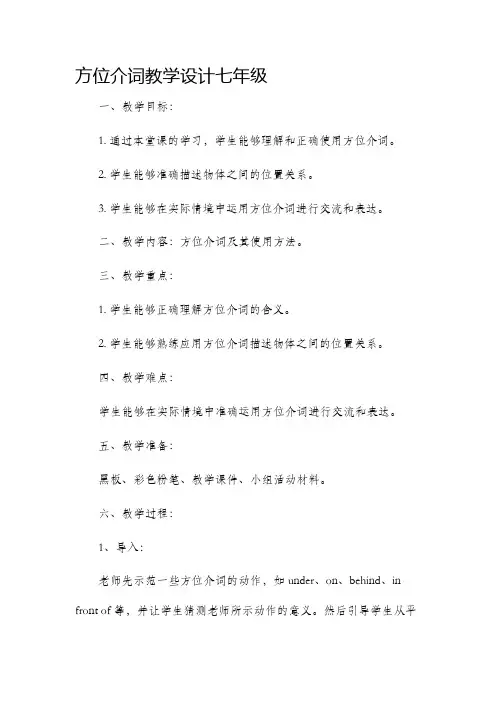
方位介词教学设计七年级一、教学目标:1. 通过本堂课的学习,学生能够理解和正确使用方位介词。
2. 学生能够准确描述物体之间的位置关系。
3. 学生能够在实际情境中运用方位介词进行交流和表达。
二、教学内容:方位介词及其使用方法。
三、教学重点:1. 学生能够正确理解方位介词的含义。
2. 学生能够熟练应用方位介词描述物体之间的位置关系。
四、教学难点:学生能够在实际情境中准确运用方位介词进行交流和表达。
五、教学准备:黑板、彩色粉笔、教学课件、小组活动材料。
六、教学过程:1、导入:老师先示范一些方位介词的动作,如under、on、behind、in front of等,并让学生猜测老师所示动作的意义。
然后引导学生从平时生活中所熟悉的地理位置和物体位置出发,了解方位介词的应用场景。
2、学习:(1)根据学生的生活经验,老师呈现一些物体位置的图片,如狗在桌子底下、书在椅子上、树在小路的旁边等,让学生看图并说出物体与物体之间的位置关系,并引导学生猜测对应的方位介词。
(2)在黑板上用图形表示不同的方位介词,如under、on、behind、in front of等,并讲解其意义和用法。
通过图形的示意,帮助学生理解方位介词的具体含义。
(3)通过示例句子和练习题,让学生掌握方位介词的用法。
如:a. The cat is ____ the table. (under/on/in front of)b. The bike is ____ the tree. (behind/in front of/on)c. The book is ____ the desk. (on/under/behind)(4)组织学生进行小组活动,让学生根据所学的方位介词描述班级里的物品位置关系。
每个小组派一名代表进行描述,其他组员根据所听到的描述来猜测物体的位置。
3、巩固与拓展:(1)老师以问答的形式,向学生提问关于方位介词的问题,并让学生回答。
鼓励学生积极参与,加深对方位介词的理解。
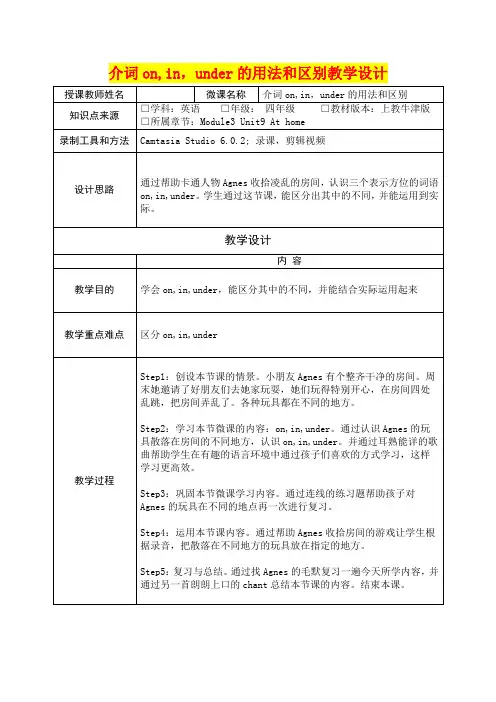
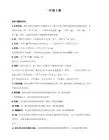
微课教学设计方案微课名称《in,on,under的基本用法》视频长度3-5分钟录制时间2018年11月14日知识点描述三个常用方位介词的使用教学类型讲授型启发型练习型教学目标使学生初步了解和掌握英文中使用频率最高、范围最广的三个方位介词“in,on,under”。
学会区分它们的含义和使用语境,并正确地运用到句子中。
设计思路本微课设计为三个部分:一、揭示微课授课内容;二、正文讲解;三、通过习题,巩固知识。
教学过程内容时间一、片头Hi,boys and girls!我们学习的介词有很多,他们与我们的英语学习息息相关,所以我们一定要认识他们,了解他们,还要学会正确的运用他们。
二、正文讲解第一部分内容:含义解释今天我们来学习的介词有三个,它们分别是in ,on和under.它们叫方位介词。
主要表示事物存在的方向和位置。
我们来认识一下这三个词in, on ,under.in在…里面.on在…上面.under在…下方用图片形式展现:在…里面:铅笔在文具盒里、水果在果盘里;在…上面:面包在桌子上;桌子在地面上在…下方:猫咪在桌子下面、鞋子在凳子下面第二部分内容:语境运用1.There is a pen in the pencil-box.钢笔在文具盒里.2.There is water in the bottle.瓶子里有水.3.There is a blackboard on the wall.一块黑板在墙上.4.There are three books on the desk.三本书在桌子上.5.There is a football under the desk.足球在桌子下面.6.There is a book under the chair.一本书在椅子下面.(配以实际语境画面)第三部分内容:用法练习你们都看懂了吗?我们一起来试试吧。
1.There are sofa in the living room.沙发在客厅里。
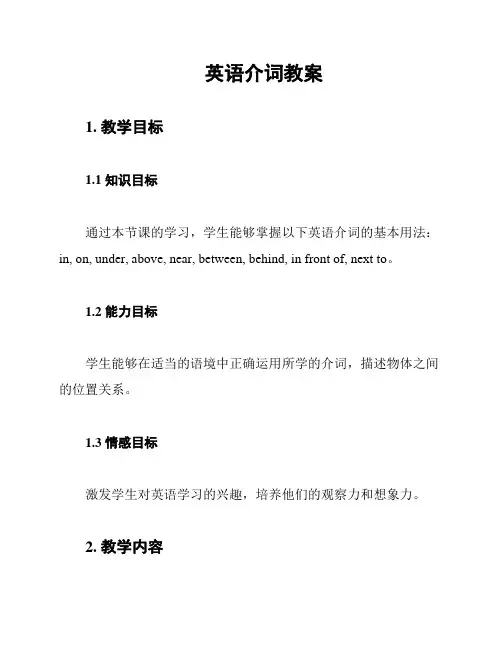
英语介词教案1. 教学目标1.1 知识目标通过本节课的学习,学生能够掌握以下英语介词的基本用法:in, on, under, above, near, between, behind, in front of, next to。
1.2 能力目标学生能够在适当的语境中正确运用所学的介词,描述物体之间的位置关系。
1.3 情感目标激发学生对英语学习的兴趣,培养他们的观察力和想象力。
2. 教学内容2.1 教材《新概念英语》第二册,Lesson 5:"Please send me a card."2.2 教学内容本节课将围绕以下主题展开:1. 学习八个基本介词:in, on, under, above, near, between, behind, in front of, next to。
2. 练习使用这些介词描述物体之间的位置关系。
3. 完成相关练习题,巩固所学知识。
3. 教学步骤3.1 热身活动(5分钟)1. 教师与学生进行简单的英语对话,询问他们关于位置的问题,如:"Where are you from?" "Are you near the window?" 等。
2. 学生相互问候,介绍自己的位置关系,如:"I am in front of the blackboard." "She is behind the door." 等。
3.2 引入新知识(10分钟)1. 教师展示一张含有不同介词用法的图片,引导学生观察并说出图片中物体之间的位置关系。
2. 教师讲解每个介词的基本用法,如:"in" 表示在某物内部,"on" 表示在某物上面,"under" 表示在某物下面等。
3. 学生跟随教师一起朗读介词的用法,并模仿示例进行练习。
3.3 小组活动(15分钟)1. 学生分成小组,每组选择一张含有不同介词用法的图片。
介词in-on--under-用法教学设计(教案)Unit 6 Where is the eraser? 教学设计(第二课时)教学内容:本单元主要内容是谈论物品的所在位置,通过这一话题,训练学生的听说读写四项基本技能,让学生通过询问物品的位置,学习一些物品的单词,及方位介词on, in, under等的用法;学习并掌握where 句型的运用,使学生养成干净、整洁、合理摆放物品的好习惯。
学情分析:本节课的教学重点是使用in,on, under,near四个介词准确表述物品在空间位置上的关系。
因为这四个介词所表达的空间位置关系和汉语是一致的,所以只要多在语境中运用,学生就不难掌握这几个词的用法。
知识目标:方位介词in, on, under near,的用法。
能力目标:掌握in, on, under,near四个方位介词;学会正确运用介词描述物品所在的位置;情感目标:培养学生整齐地摆放自己物品的生活习惯。
Teaching procedures:Step 1 Lead in1.Greetings;2.Show the students a video about “in on under”.(让学生初步感知in, on, under 三个词的涵义)Step 2 Presentation1.New words1) Show a picture of “ in, on, under ” and teach the Ss some gestures. 2)Understand in the scene.T: Where’s the ruler?Ss: The ruler is in the desk.The ruler is on the desk.The ruler is under the desk.(利用多媒体课件创设情景,直观呈现单词,使学生在语境中理解单词。
)3)Teach the Ss a quick songT: Ok, I’ll teach you a quick song. Show me your hands. Ok,now, go like this.(Teach them the gestures about in, on, under)T: Now, let’s sing toge ther. In, on,under; In, on,under; In, on,under; The dog is under the car.(通过歌曲,游戏,激发学生的学习兴趣,并继续加强对三个介词的理解及掌握。
小学英语方位介词课程设计一、课程目标知识目标:1. 学生能够掌握基本的英语方位介词,如in, on, under, behind, in front of 等。
2. 学生能够运用所学方位介词描述物体位置,理解并执行简单的指令。
3. 学生了解并能够使用含有方位介词的句子,如“Where is the book? It's on the table.”技能目标:1. 学生能够通过听、说、读、写的实践活动,熟练运用方位介词。
2. 学生能够在小组合作中,用英语进行简单的位置描述和交流。
3. 学生能够利用所学知识,解决实际生活中的位置问题。
情感态度价值观目标:1. 学生养成合作学习的习惯,增强团队意识。
2. 学生在英语学习过程中,体验成功,增强自信心,激发学习兴趣。
3. 学生通过学习方位介词,培养空间概念,提高观察力和逻辑思维能力。
分析课程性质、学生特点和教学要求,本课程以小学高年级学生为对象,结合他们好奇心强、活泼好动的特点,设计生动有趣的教学活动。
通过实际操作、互动交流等方式,使学生将所学知识应用于实际情境中,提高英语运用能力,培养正确的情感态度和价值观。
课程目标具体明确,便于教师进行教学设计和评估,确保学生能够达到预期学习成果。
本章节教学内容以人教版小学英语教材中方位介词为主题,结合课程目标,进行以下组织和安排:1. 引入方位介词概念:通过图片展示、实际操作等方式,使学生了解和感知方位介词的基本含义,如in, on, under, behind, in front of等。
2. 教学大纲:a. 方位介词的定义与用法:讲解各个方位介词的含义,并通过实例演示如何运用这些介词描述物体位置。
b. 实践活动:设计听、说、读、写四个方面的实践活动,让学生在实际语境中运用方位介词。
c. 句子练习:结合方位介词,教授如何构造简单的位置描述句子,如“Where is the book? It's on the table.”3. 教学内容安排:a. 第一节课:引入方位介词概念,学习in, on, under三个介词。
inonunder教学设计第一篇:in on under教学设计【教学目标】(一)知识技能目标:1.懂、会读、会说、会写单词where, in ,hat, on, under。
2.能听懂、会读、会写句子Where is my pen? It’s in my hat.It’s on my hat.It’s under my hat.(二)运用能力目标:1.学习怎样用英语询问某物的方位及回答的日常交际用语掌握相关单词和句型,并能综合运用新、旧知识组织对话完成一定的交际任务。
2.增加已学知识的复现率,培养学生对重点单词和句子的认读能力(三)素质教育目标:1.培养学生浓厚的英语学习兴趣,积极参与说英语、做游戏等实践活动。
2.帮助学生树立较强的自信心,培养学生乐于与他人合作的精神与竞争意识。
【教学重点】1.能够用英语询问某物的方位及回答的日常交际用语。
2.能听懂、会说、会读以下句子:Where is my pen?It’s in my hat.It’s on my hat.It’s under my hat.并能进行扩展,在实际生活中灵活运用。
【教学难点】1.熟练掌握本单元的单词和句型,能在实际生活中灵活运用。
2.创设英语情景,使学生正确运用所学知识用英语来询问某物的方位及回答的日常交际用语。
【教学意图】1.培养学生对重点词汇和句子的认读能力。
2.培养学生的听说能力。
3.激发学生的求知欲,创设各种真实或接近真实的语言环境,让学生积极参与体验。
【教具准备】1.教材相配套的教学挂图,录音。
2.准备小奖品。
【教学过程】Step 1.Warming-up1.教师热情地和学生打招呼问好,做简单的Free Talk。
2.之后和学生一起拍手说唱第七模块第二单元的英语chant。
3.教师问同学们:“Do you like games? Now let’s play a game.”教师拿出一个装满文具的盒子,里面可以放上本节课所需的物品,教师问学生:“What’s this?”学生回答:“It’s a box.”教师问:“Can you guess what’s in this box?”让学生猜猜盒子里都有什么东西?(设计说明:教师每次拿出一件物品后,都有意识地让学生看清楚并记住都有什么,教师可以在本环节设置另一项活动,即把从盒子里面拿出的一件学习用品放在一本书下,然后在本游戏结束后,教师问学生:“Where is my pen?”让学生体会其含义,为下一个环节做准备。
方位介词教案初中一、教学目标:1. 让学生掌握常用的方位介词,如:north, south, east, west, up, down, left, right, in, on, under, behind, in front of等。
2. 培养学生运用方位介词描述物体位置和方向的能力。
3. 提高学生的情景交际能力,能够在实际生活中运用方位介词进行有效沟通。
二、教学内容:1. 方位介词的定义和用法。
2. 方位介词的辨别和搭配。
3. 方位介词在情景交际中的应用。
三、教学步骤:1. 导入:利用图片或实物,引导学生观察并说出物体的位置和方向,如:“The cat is on the mat.”、“The book is under the table.”等。
2. 讲解:讲解方位介词的定义和用法,如:- in:表示在某范围内,如:“She is in the room.”- on:表示在某物体表面,如:“The map is on the table.”- under:表示在某物体下方,如:“The pen is under the book.”- behind:表示在某物体后面,如:“The cat is behind the chair.”- in front of:表示在某物体前面,如:“The door is in front of the window.”讲解方位介词的辨别和搭配,如:- up:表示向上,如:“The bird is up in the tree.”- down:表示向下,如:“The cat is down on the ground.”- left:表示向左,如:“Turn left at the corner.”- right:表示向右,如:“Turn right after the post office.”3. 练习:设计一些练习题,让学生辨别和运用方位介词,如:- 完成句子:将缺失的方位介词填入句子中,使句子完整。
《介词in,on,under的简单使用》教学设计教学理念:儿童天性活泼、好奇,可塑性强,易于接受新事物,但少儿注意力持续时间短,记忆多为机械。
重复的感性记忆,思维能力和知识结构均不完善。
因此枯燥的讲解与机械的灌输,只会让其丧失学习兴趣和自信心。
因此,少儿英语教育,不必一味强调语言的内在规律,而应根据儿童身心特点,扬长避短。
在方法上,始终坚持以学生为中心,用灵活多样、直观生动的教学形式,营造出轻松活泼的语言接受氛围,充分体现少儿英语的优势。
教材分析:PEP小学英语三年级下册Unit5 Where is my ruler?第一课时Let’s talk部分是通过情景会话,让学生学会提问和回答物品所在位置Where is…?It’s in /on/under…并能在实际情景中自然运用。
本微课是通过课件的演示,让学生对这三个介词的方位一目了然,增强学生的学习兴趣和记忆力。
语言知识目标:通过学习掌握介词in on under 这三个介词。
能力目标:通过练习,能简单的描述物品的方位。
听懂Where is ....句型。
教学内容:in on under的简单使用。
教学重难重点:in on under 三个介词。
难点:under的方位描述。
教学过程:Step one:课件展示T:Look at the ball. Where is the ball?引出介词in,讲解in表示在...的里面举例:课件展示,Where is the monkey?It is in the toy box.课件展示,Where is the bird? It is in the tree. Step two:课件展示 Look at the ball. Where is the ball?引出介词on,讲解on表示在...的上面举例:课件展示,Where is the monkey?It is on the desk. Step three:课件展示T:Look at the ball now. Where is the ball?引出介词under,讲解under表示在...的下面举例:课件展示,Where is the monkey?It is under the desk. Step four:记忆大挑战,请同学们快速的说出答案,这部分充分利用课件制造动画效果,让学生们注意力集中并快速的练习in,on,under。
Unit 4 Where’s my schoolbag?
Prepositions: in on under
壶瓶山镇中心学校王娴
教学内容:
本节内容选自新目标英语七年级上册(人教2012版)第四单元,本单元主要内容是谈论物品的所在位置,通过这一话题,训练学生的听说读写四项基本技能,让学生通过询问物品的位置,学习一些物品的单词,及方位介词on, in, under等的用法;学习并掌握where句型的运用,使学生养成干净、整洁、合理摆放物品的好习惯。
学情分析:
本节课的教学重点是使用in,on, under三个介词准确表述物品在空间位置上的关系。
因为这三个介词所表达的空间位置关系和汉语是一致的,所以只要多在语境中运用,学生就不难掌握这几个词的用法。
知识目标:方位介词in, on, under 的用法。
能力目标:掌握in, on, under 三个方位介词;
学会正确运用介词描述物品所在的位置;
情感目标:培养学生整齐地摆放自己物品的生活习惯。
Teaching procedures:
Step 1 Lead in
1.Greetings;
2.Show the students a video about “in on under”.
(让学生初步感知in, on, under 三个词的涵义)
Step 2 Presentation
1.New words
1) Show a picture of “ in, on, under ” and teach the Ss some gestures 2)Understand in the scene
T: Where’s the dog?
Ss: The dog is in the car.
The dog is on the car.
The dog is under the car.
(利用多媒体课件创设情景,直观呈现单词,使学生在语境中理解单词。
)
3)Teach the Ss a quick song
T: Ok, I’ll teach you a quick song. Show me your hands. Ok,now, go like this.
(Teach them the gestures about in, on, under)
T: Now, let’s sing together. In, on,under; In, on,under; In, on,under; The dog is under the car.
(通过歌曲,游戏,激发学生的学习兴趣,并继续加强对三个介词的理解及掌握。
)
2.Practice
1)Listen to a short story and answer three questions blow:
Q1: Where’s Mimi?
Q2: Where’s Nini?
Q3: Where’s Miaomiao?
(讲故事,创情景,提问题,培养学生解决问题的能力。
) 2)Pair work
3.Summing up
Step 3 Homework
Make 3 sentences with “in, on, under”.
(课后任务的布置,对所学内容起到复习巩固的作用)。